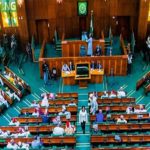Mukaila Lamidi Auxiliary: Life and Career is a literary biographical book, creatively telling stories of a rascally boy, who wobbled through the undulating paths and snaky roads of existence to become a man of heroism. Written by Biola Layonu and Freeman Okosun, two partners in the practice of biographical documentations, this book is very unique, captivating and desirable. It treats issues of political history, socio-political struggles, childhood plays and pranks, street life, friendship fun and traditional polygamous setting where rivalry, pettiness and jealousy often rear their heads.
Interestingly, the authors take a reader from floating in one stream of exciting story to another, and then to another, making the reader enjoy tributaries of stories flowing into the sea of pleasurable reading. Biola Layonu and Freeman Okosun succeeded immensely, in telling stories about Mukaila Lamidi, whose father, a civil servant,had wished that he (Mukaila) went to school and eventually become a civil servant as well. But alas! A father’s idea of travel by air was quite different from the son’s idea of travel by road.
Indeed, seeing a book on Mukaila Lamidi, alias Auxiliary, one’s mind would be congested of various ideas. Here is a rugged and dogged man who holds the society with a firm grip, because, he believes that the society holds him with iron hands. The good thing is that the authors have told stories that the society cannot ignore, but to read in order to know the true person of Mukaila Lamidi and his hustles and bustles to be able reach the arena of leadership. From a nobody, he bulldozed his way to become somebody, who now dines and wines with the high and mighty.
In Chapter One of the book, the reader is introduced to Pa Lamidi’s polygamous home into which Mukaila was born.
Mukaila’s start of elementary school is captured in Chapter Two. Here, the authors gave an account of General Yakubu Gowon’s visit to Ibadan, how Mukaila and a number of pupils were lucky to shake Gowon’s hand, and how Mukaila developed hatred for school environment as a result of being flogged by Teacher Ajala.
The incidents in Chapter Three are quite attention-grabbing. Against Pa Lamidi’s strong wish, Mukaila refused to taste the juicy apple of secondary school education. Despite his good First School Leaving result, and Fatimah College, Ikire, waiting to welcome him, the boy Mukaila, who already had hatred for school environment, turned his back. Instead, at the age of 12, he drank the strong wine of street life to define his own kind of freedom existence, and not a regimented life of civil service.
For what seemed like a dark moment, Mukaila left Ibadan for Lagos to begin a new life of making ends meet. This new life of Mukaila was painted on the canvas of Chapter Four. While in Lagos, he worked as a bus conductor, saved money and eventually gained admission into a driving school to earn his driving certificate. Along the line, the death of his father, Pa Lamidi, which Mukaila read in a letter sent to him, hit him so hard and got him devastated. “Mukaila had not cried in years,” the authors wrote on page 98/99, “he was a man of the streets, and one thing every person from the street would always learn, was hardiness, to be unfeeling. But as Mukaila held the letter, he could not withhold the urge to cry. It was the only way he could loosen the grip that was tightened round his neck like a noose. He covered his hands round his face and wept.
This book is a biography of important revelations. It is a revelation of motor park society in which the leader enjoys robust financial benefits, and he is highly respected by his followers.
- Anthony, a poet, puppeteer, performer and publisher, is based in Ibadan.






